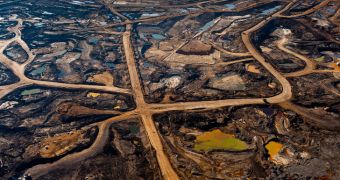According to the findings of a recent report authored by Environment Canada, the energy industry is currently the country's top source of greenhouse gas emissions. Needless to say, this makes it a major contributor to climate change and global warming.
Think Progress informs that, in its report, Environment Canada writes that, according to data at hand, Canada's energy industry must presently be held accountable for about 25% of the country's overall greenhouse gas emissions.
This means that this industry currently causes more damage to the environment than Canada's transportation sector does, the same source details.
Specialists working with Environment Canada argue that, all things considered, Canada's energy industry is now a noteworthy source of greenhouse gas emissions partly due to the fact that tar sands extraction activities have pretty much boomed in this part of the world in recent years.
More precisely, it would appear that, although the country has managed to cut its overall emissions by 7% since 2005 until present day, tar sands production has experienced an increase of 107%.
Environment Canada explains that this increased tar sands production in Canada is chiefly due to exploitation activities in Alberta, i.e. a region considered to be the country's main source of tar sands reserves.
Greenheads and specialists explain that, due to their makeup and consistency, tar sands cannot be exploited using conventional equipment and processes. Hence, workers must resort to controversial practices that have been documented to release more greenhouse gas emissions.
“Since 2005, total emissions from all reporting facilities have decreased overall by 7%. Ontario-based facilities within the Utilities and Manufacturing sectors experienced the largest declines over this eight-year period, while reported emissions increased from facilities within the Mining, Quarrying, and Oil and Gas Extraction sector, largely in Alberta.”
“The non-conventional oil extraction subsector showed the largest overall increase in emissions since 2005, reflecting this sector’s steady growth trend,” governmental organization Environment Canada details in its study on emissions from Canadian industry facilities in the year 2012.
Despite the fact that the country's overall greenhouse gas emissions have dropped by about 7% when a 2005 baseline is taken into consideration, it would appear that, when compared to the year 2011, emissions documented in 2012 are just 1% lower.
Environmentalists worry that, should the country's tar sands industry continue to develop in the years to come, Canada will fail to meet its goal to reduce greenhouse gas emissions by 17% when compared to 2005 by the end of this decade.

 14 DAY TRIAL //
14 DAY TRIAL //